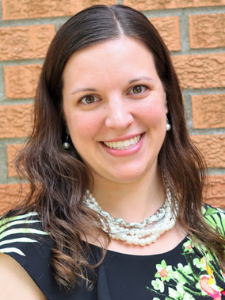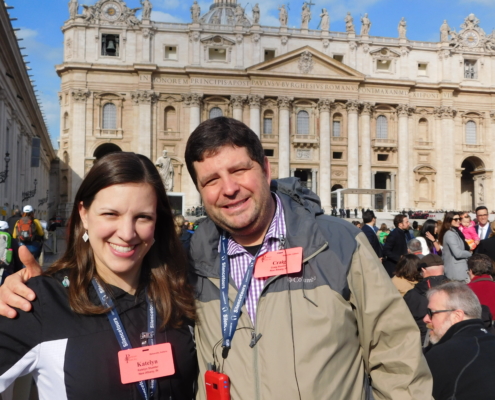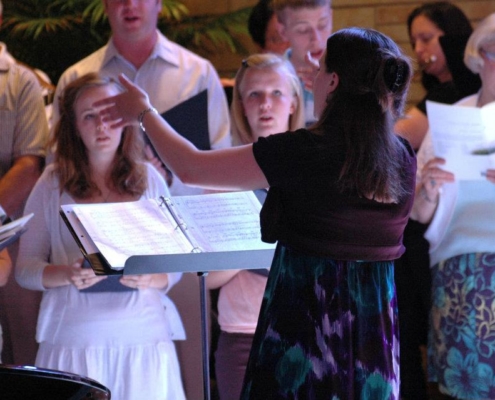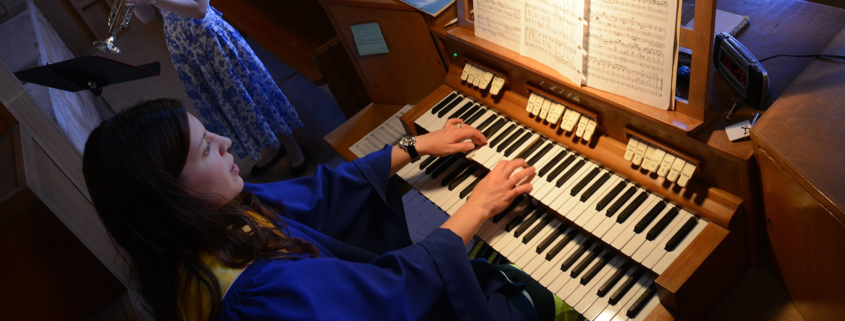Parish Music Director Draws Upon College Experience of Beautiful, Reverent Music
Katelyn Stumler was exposed to beautiful and reverent liturgical music while a student at Magdalen College of the Liberal Arts in Warner, N.H., which is recommended in The Newman Guide. Now as the music director at a Catholic parish in Indiana, she shares this gift with parishioners—even throughout the COVID-19 shutdown.
The Newman Society recently asked Stumler to share about her experience at Magdalen College and how it prepared her for her work and ministry, as a part of “Profiles in Faithful Catholic Education” series.

Katelyn Stumler
Newman Society: What was your experience like at Magdalen College of the Liberal Arts, and how has it impacted your life?
Katelyn Stumler: I began my freshman year at Magdalen College in the fall of 2004 after 12 years of homeschooling. My older sister, Jolene (Walker) Nelson, was a current senior at Magdalen that year. We were no strangers to the school. My mom had some friends who had attended the college in the early years, and Jolene and I had both attended several of Magdalen’s summer youth programs as high schoolers.
My first memory of Magdalen College really expresses the overwhelming “theme” that I focus on when reflecting my experience there. My family decided to travel from where we lived in upstate New York and check out the campus one summer when we were visiting my aunt and uncle who lived in the Boston area. Upon our arrival, a current student working as a summer program counselor came to welcome us with a spirit of genuine Christian joy and hospitality. That spirit stuck with me. I wanted to be a part of that.
I loved the liberal arts education I received at Magdalen. The Great Books program opened me up to so many great philosophers and theologians, and the Socratic method dialogues that took place in many of my classes led me down a fresh new pathway of thinking in a way I never had before. I learned the goodness of searching, of asking questions, of coming to know myself and understand humanity more, even if, in the end, it left me with more questions than I started with. I find myself approaching professional development opportunities and information today with that same open and inquisitive mind that was cultivated at Magdalen.
I came away from my years at Magdalen with an enriched spiritual life. Celebrating daily Mass as a community, praying Compline each evening with the ladies in St. Mary’s Residence Hall, celebrating full and noble liturgies with beautiful music—all these elements made a big difference in my life and instilled spiritual habits that remain with me today. The Blessed Sacrament was reserved in the residence chapel, and I recall sensing great comfort knowing that Jesus was present in that place where I studied and slept.
The friendships I made at Magdalen were deep and lasting. Some of my dearest friends today are fellow Magdalen alumni. Even though I do not live near many of them, we stay connected across the miles. The community life at Magdalen fostered strong ties between people. The fact that we “did” all of life there together, from worshiping and singing to hiking mountains and cleaning bathrooms, cultivated these strong bonds. People cared about each other there and wanted to be present to each other, whether it was helping with an academic assignment or taking a walk to talk over a personal struggle. I learned what it means to be a good and genuine friend at Magdalen, and I hope I have taken these qualities and brought them to others that I have met since moving from upstate New York to southern Indiana in 2008.

Craig and Katelyn Stumler
While I was at Magdalen, I was blessed to study abroad in Italy the summer following my sophomore year. The time spent in Rome and Norcia, the birthplace of St. Benedict, was an incredible opportunity to study and experience the history of Christianity and western culture. I am very grateful to Magdalen for providing me with this opportunity. I have had the immense privilege of returning to Italy and traveling to the Holy Land with my husband, Craig, through pilgrimages organized by my parish.
Newman Society: How did your education at Magdalen College help prepare you for your work during the COVID-19 crisis?
Katelyn Stumler: I have worked as a full-time director of music at Our Lady of Perpetual Help Catholic Church in New Albany, Ind., for the past 12 years. I had amazing opportunities at Magdalen to be involved in three different choirs (the main choir, performance choir and polyphony choir) that built upon my knowledge of music and singing for the liturgy.
When I was at Magdalen, the entire student body (probably around 75 students at the time I was a student) participated in the main choir, with a rotation system of who would sing at Sunday Mass so as to comfortably accommodate numbers in the choir loft at our college chapel. It was an incredible experience of unity for all of us, those who loved singing and those who didn’t, as the world of Catholic liturgical music was opened up to us: hymnody, Gregorian Chant (using the Graduale Romanum) and various choral works from different time periods. I dare say that by the time a student completed his or her four years at Magdalen, even those who may not have ever pictured themselves singing in a choir found that experience highly rewarding and life-changing.
During my sophomore year at Magdalen, I began occasionally accompanying one or more of the choirs on piano and organ, and my junior and senior year, I was the main accompanist for all the choirs for rehearsals, liturgies and performances. I had played for Masses and choir rehearsals at my parish church most of my teenage years prior to this, but at Magdalen, this skill was honed and shaped in ways that definitely prepared me to take on the role of music director for a parish of nearly 1,000 families.
Our parish began livestreaming Sunday Masses on the fourth Sunday of Lent, March 22, 2020, in response to the decision to suspend all public Masses in the Archdiocese of Indianapolis to slow the spread of the COVID-19 virus. At first, Masses took place with no music. But once we got to Holy Week, my pastor, with the approval of our archbishop, invited me to start adding music to the liturgies. Of course, all this had to be done in a way that could be captured on camera, which consisted of Father’s phone mounted on a simple tripod. We were not using microphones so as to cut down on the echo in the empty church, so singing while accompanying myself far away from the phone camera was not an option.
At this time, I turned to my experiences at Magdalen to enlighten my musical choices and decisions for Mass. I sang the Entrance Antiphon using the Simple English Propers, a project and book from Adam Bartlett, sponsored by the Church Music Association of America. I was introduced to this resource after my Magdalen years, but my knowledge of chant from the Graduale Romanum made very familiar and comfortable with the chant notation. I used the St. Meinrad psalm tones to chant the responsorial psalm and Communion antiphon for these Masses. I was first introduced to these psalm tones at Magdalen as well and use them on a regular basis for all parish liturgies, even before we were livestreaming due to COVID-19. Throughout the Sacred Paschal Triduum, I found myself drawing back upon my music experiences during those three holy days at Magdalen, as the custom at the college was to observe Holy Week and Easter on campus. On Easter morning, it gave me great joy to chant the Victimae Paschali Laudes sequence, a chant that I also learned while at Magdalen and continue to use, normally with my parish choirs, but on my own during livestreaming.
I also have my education at Magdalen to thank for my first introduction to the liturgical documents of the Church, which also proved most valuable during this COVID-19 crisis. I am a member of the Music Commission for the Archdiocese of Indianapolis. When those of us on the commission found ourselves having to think “outside of the box” for ways to continue the work of our ministries, we decided to produce a series of videos for our fellow music directors on everything from cantor preparation and surviving as a liturgical minister during the pandemic to accompaniment techniques and an introduction to the General Instruction of the Roman Missal (GIRM). I took on the challenge of presenting on the GIRM, once again drawing on my education from Magdalen, even consulting notes in the margins that I took during classes nearly 15 years ago.
On a slightly humorous note, I can say that my Magdalen college experience in effective dialogue and conversation have helped me navigate the plethora of Zoom meetings of which I was a part during the shutdown!

Katelyn Stumler
Newman Society: Why do you think beautiful and reverent music is important? How did you try to educate parishioners about liturgical music during COVID-19?
Katelyn Stumler: The Catechism of the Catholic Church (which I also studied from cover to cover at Magdalen) states that the Eucharist is the “source and summit of the Christian life” (quoting Lumen Gentium, one of the Vatican II documents). The liturgy deserves beautiful and reverent music. Music naturally makes a lasting impression on people. There is a saying that what people remember most about coming to Mass is the homily and the music, and while that is somewhat comical, it does impress upon me that music choices for the liturgy need to be made intentionally and mindfully. My experiences with beautiful and reverent music at Magdalen equipped me to step into my role as director of music at my parish.
During these times, I have tried to bring beautiful and reverent music to our parishioners through what I am able to do at our livestreamed Masses. I have shared past recordings of our choirs with our parishioners through Facebook and Flocknote, a great parish communication tool. Another parish musician and I have worked together to create weekly YouTube playlists of hymns and songs appropriate for each Sunday to share with parishioners, incorporating some of the music our choirs would have sung if we had been able to celebrate Mass together in a public setting. I have encouraged our other parish accompanists and musicians to record themselves singing or playing their instrument at home so we can share these offerings on social media. I have even done some experimentation on singing apps that create multi-frame collage videos of several people singing. Since the choirs have not been able to gather or sing together, I have spent some time reaching out pastorally to our parish choir members and musicians through emails, text messages and phone calls.
During all the challenges, disappointments and tragedies of this pandemic, it has been such a blessing to reflect upon my Catholic college experiences that have helped me respond in the best possible way as a parish director of music.

